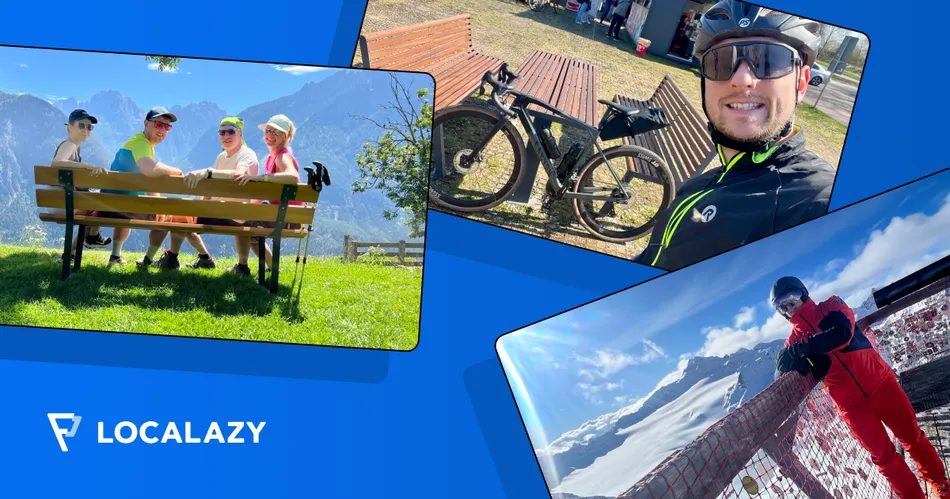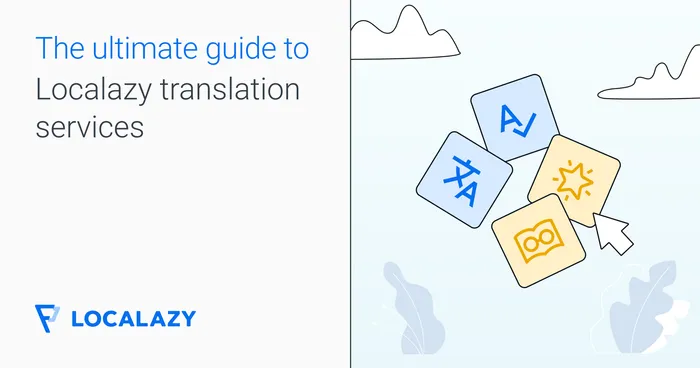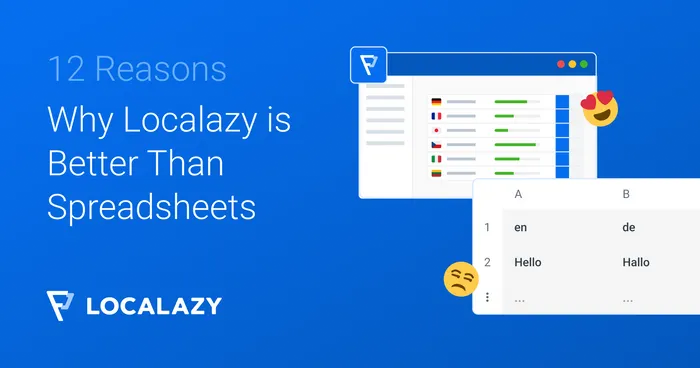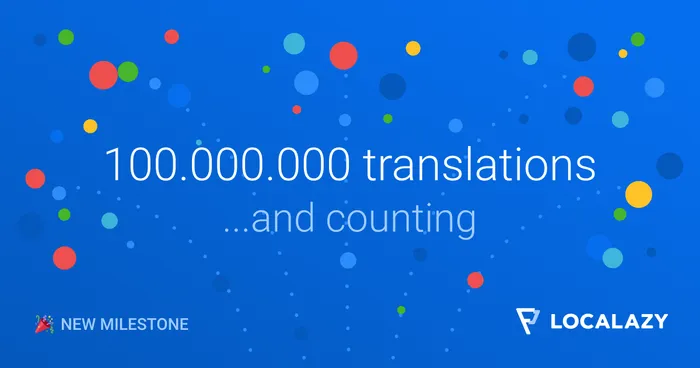Developers are the backbone of Localazy. Since our TMS's inception and launch in 2020, engineers have been key players behind our growth. Our product was initially created by a developer, our CEO Václav Hodek, with developers in mind: we wanted to make their lives easier, reduce friction, and make localization a solution instead of a problem so they could focus on what matters most.
Nothing has changed in that respect—but as we grew, our team of engineers and our pool of potential users increased exponentially. With seven team members working on UI and backend, our software becomes more sophisticated day to day. Today, we get to know one of the wizards who makes it possible: our full-stack developer David Václavek.
David is 31 and lives in Katowice (PL) with his partner, Iza, and his dog, Heniek. Originally from Děčín, he's an avid reader and traveler with a knack for different sports. Let's meet him, shall we?

🧑💻 Meeting David 🔗
Hey, David! 👋 Tell us - what is your role at Localazy?
Hi! At Localazy, I primarily work on the main product, which is the application. However, if there's a need to develop any backend microservices, I can handle that as well. 💪 Hence, I consider myself a full-stack developer. Additionally, I'm heavily involved in reviewing and testing tasks from other members of the front-end team to ensure the quality of the code that goes into production.
For those who don't know, what does a full-stack developer do, and why is it such an impactful role?
A full-stack developer can create the front-end application and manage the backend. This means being able to work independently on both parts of the application. The role is impactful because the output of my work directly influences what users see and experience on their screens. Therefore, the overall user experience depends on the quality of development. As more users use the application, it becomes increasingly important for developers to ensure its quality. I collaborate closely with my colleagues, including designers, through several rounds of brainstorming to ensure the functionality aligns with marketing perspectives and with Vašek, who handles the backend if needed.
What do you like the most about your job at Localazy?
What I appreciate the most about my job at Localazy is the collaborative nature of problem-solving within the company. From the initial concept to deployment, everything can be discussed with the rest of the team, which helps resolve any sudden uncertainties effectively. This ties into the main point of cohesion: we support and encourage each other. 🫶 The team culture is exceptional, and over the years, I feel we've grown not only as colleagues but also as friends beyond the work aspect.
"Being a full-stack developer is an impactful role, as the output of my work directly influences what users see and experience on their screens."
Let’s talk about your background. What’s your prior experience and education?
I studied IT engineering at the Technical University of Liberec, in the Czech Republic. Since elementary school, I was drawn to logical thinking and exact sciences, especially mathematics. 💭 Even as a child, I subconsciously knew I wanted to apply this thinking to my future work.
During my studies, I worked for a few months at a large company as a front-end developer but realized the 9-to-5 routine wasn't the lifestyle I wanted. I needed more freedom and flexibility in my life. So, I started freelancing as a full-stack developer. I did that for five years, focusing on e-commerce development using PHP, JavaScript, and Angular. By chance, I met our Product Manager, Honza Bílek, as we were likely the only two Czechs in Katowice (Poland). 😅 We became friends. Honza told me a lot about Localazy, and after some time, he presented an offer that was hard to refuse—to join the team.
Who are your main professional inspirations or role models, and why?
Perhaps it's odd for many people, but honestly, I've never had an idol or someone I aspired to be like. We are all different, with our strengths and weaknesses, so I try to learn from the good in everything. It's not about personalities but values. I respect and adhere to values like honesty, diligence, hard work, and the ability to see things through to the end. I'm a perfectionist, so if something doesn't seem right, I strive to solve the problem, both in work and in life.
However, if I had to name a few inspirations, they would be my family, who have always supported me through my studies and work challenges; my goals, which drive me forward; and (perhaps a bit cliché) Apple as a company. I'm a fan, and their meticulously crafted products make my life easier, which ties into my aforementioned perfectionism. 😁
Any personal interests you're passionate about?
I enjoy various sports and physical activities, but hiking, skating, and cycling are my favorites. In recent years, squash 🏸 has captured my interest, and if possible, I play several times a week. I've never been much into TV, video games, or movies; I prefer reading a book or taking a walk in nature with my dog. 📚 I'm interested in educational books about nature and world development, productivity, health, and mental resilience. Generally, I'm curious about how things work. I also enjoy playing board games that require logical thinking.
Traveling and exploring new places are my passions; you won't find me lounging on a beach during vacation. 🏃♂️🗺️ I also enjoy photography, although sorting through heaps of vacation photos afterward is less enjoyable. Additionally, I like exploring software/hardware gadgets that could assist me in my daily life.

💻 A day in the life of a full-stack dev 🔗
What does your usual workday look like?
I'm not exactly an early bird: I start to work around 10 AM when I arrive at the co-working office. ☕️ I have a nice half an hour during my morning stroll to think about the problems I'll be tackling that day. Then, I divide my work into roughly two-hour blocks. Since my profession requires deep concentration to understand the problems I'm solving, it's the ideal time for me to make progress and form cohesive thoughts, or write meaningful blocks of code that I can leave behind.
After two blocks, separated by a short break, comes lunchtime, and then there's another work block. 🧑💻 Then, I head home to enjoy the rest of the afternoon, perhaps engaging in some sports activities. Occasionally, in the evening, I sit down at the computer to handle some administrative tasks: emails, support, and messages saved throughout the day that I didn't want to deal with at the time to avoid distracting myself from focus.
You operate in a fairly small team, with Dan and you as the coding warriors. How do you organize… and how intense is the workload?
Since the question was posed, we've added two more coding team members. 🎉 However, the workload per person hasn't decreased. It's true that we're now able to iterate on more things simultaneously, which pushes the company forward. Because we all share a common ultimate company goal, no one slacks off. Even if someone finishes their work for the current sprint early, we come up with additional tasks. By planning bi-weekly sprints together and assigning a clearly defined scope of tasks, we can accurately assess the time required for each and distribute them reasonably.
What’s the main project you’re working on at the moment?
I'm currently working on improving client onboarding, specifically iterating on the integration page in the main product to make it more user-friendly. 😊
In which language do you enjoy coding the most?
Without a doubt, JavaScript, or more precisely, TypeScript, especially within the Vue.js framework. Historically, I've worked with Java during my school years and PHP in my early career, but I've come to prefer TypeScript, which is my top choice now.

Let’s talk about integrations. Localazy has over 70! What does the building process look like, and how do you decide which platform to tackle next?
There are two different types of integrations:
- 🗂️ Integrations of file formats are handled by Vašek, who develops backend support for processing.
- 📲 Integrations with third-party platforms (such as Figma, Strapi, or Zapier) are mainly my responsibility.
The development of the initial version varies from weeks to months, depending on the readiness of the platform for localization. Some platforms' APIs only require the use of a couple of simple endpoints (like Storyblok). In contrast, others are more complex, requiring a significant portion of the data processing process to be custom-written (like Strapi). It also depends on the clarity of the documentation; Figma's documentation is particularly clear. The development process involves a quick proof of concept to verify that integration with the platform is possible.
If successful, the first minimal version is created for user testing. 🔍 Feedback is then collected to improve the integration. The decision to proceed with a particular integration depends on several factors, such as its potential for sales, the type and number of users on the platform, the complexity of integrating the platform, and, last but not least, the number of requests for integration from our existing/potential users. Each parameter is weighted, and this weighted average determines the next integration.
"We have integrations with file formats and with third-party platforms, like Zapier or Storyblok. The decision to proceed with a particular one depends on sales potential, number of users, complexity of integration and number of requests from our client base."
What about testing? Is it very time-consuming?
We ensure that a significant portion of our code is tested automatically (with end-to-end and unit tests). Every new feature goes through the most important tests, especially for workflows and screens displaying financial data, where a major error could have fatal consequences. 💣 Before releasing a new version, there's a comprehensive manual test across all parts of the app affected by the current code changes.
However, testing essentially occurs every day as we develop the product on our test version: errors pop up, which we either log or fix immediately (depending on the severity of the error). The test version usually goes into production every week. Of course, not all tests can be completely automated (e.g., critical operations for the Figma plugin), so manual testing is necessary, but it's reduced for smaller applications.
Occasionally, an issue with unoptimized code negatively affects users' experience with the app. These issues may not be detected during testing with test data and only manifest with production data (usually larger volumes). In such cases, we need to identify the extent of the affected group and react quickly with a fix. Additionally, we're continually working on improving our testing system to make it faster and more reliable.

🔭 New projects ahead 🔗
What does the optimization process look like for translation and l10n databases? What can be improved?
This question is more suited for Vašek, but given my background in e-commerce and product databases, I can imagine that crafting a complex database query optimally can take quite some time. It also depends on the proper/suitable design of the database layer, indexing, and caching - sometimes, it feels like magic :)
Is there something that is very dear to your heart and that you love working on?
For me, it's not necessarily about the project itself but more about the process. Sure, some projects are more or less enjoyable overall, but there are always beautiful moments to be found within each project.
I enjoy, for example:
- 🕵️♂️ Delving deep into code and optimizing its performance on larger datasets.
- 🖌️ Pixel-perfect development and styling of some nice graphical components.
- 👀 Code review and testing. I enjoy finding areas where the app could potentially fail in some instances.
In the same vein, is there any project you’re especially proud of?
I'm pretty pleased with how far we've taken our Figma Plugin. It has quite a bit of traffic and good feedback from our users; nevertheless, we have several ideas in mind on how to further automate the entire experience—that's something I'd like to delve into in the near future.
📐 Browse our complete guides about Localazy ft. Figma here!
The job of a full-stack developer not only involves coding and back-end work. What about the front end? How are UX and user feedback important?
In my opinion, both go hand in hand. If the application were theoretically perfect in terms of UX and the user base were rapidly expanding, there would be no feedback (or only positive feedback). That means constructive opinions from our users are extremely important and have a huge impact on where Localazy is headed. We're hungry to improve Localazy, and many brilliant ideas have come from our users' feedback, which has opened our eyes and helped us introduce new functionalities into the application. One example is the feature of uploading screenshots from Figma, which stemmed from user feedback.
🦾 The future of l10n & LLMs 🔗
Did you know anything about localization before you embarked on this job?
I always understood its importance. Here's a simplified example from my work experience in e-commerce: How can you sell your products internationally over the Internet if people don't exactly understand what they're buying? We localized a few smaller websites, mostly manually, without a proper management system—and perhaps partly because of that, some of those websites no longer exist. However, I never knew the intricacies and challenges of solving localization problems until I joined Localazy.
In your opinion, why is localization so important?
If even the best product doesn't speak the user's native language, it may appear untrustworthy. 😬 What good is an amazing product if you don't want to use it? For some customers, the language barrier can be so significant that it becomes completely unusable for them. 🥫 Would you eat a local product imported into your country if you had no idea about its ingredients based on the label? What if you have an allergy? This is where localization becomes a matter of life and death.
"What good is an amazing product if you don't want to use it? For some customers, the language barrier can be so significant that the product becomes completely unusuable."
Localization serves other obvious general purposes besides building trust, such as expanding into international markets, building a brand on a global scale, adapting the product to users in local markets, and removing the language barrier.
How has automation impacted the localization industry, and how do you think it will further change it?
🏭 When machines took over human work during the Industrial Revolution, production accelerated significantly, thus shortening product time to market. Alongside this, production errors were also reduced. Automation as such is, therefore, not a novelty but a borrowed principle.
The consequences are very similar for localization; I would call it a localization evolution. Increased efficiency in localization, automation of repetitive tasks, acceleration of translation delivery into the product, and thus of the time-to-market. Technologies like machine translation, content delivery networks (CDN), integration with third-party systems, continuous integration, and others all contribute to the acceleration of the localization industry. Today, we can do all of this while maintaining linguistic accuracy and cultural customs. However, what could cause a revolution is machine learning and, consequently, AI.

Is machine learning going to flip the way we look at localization and translation management systems?
Many people argue that machine learning and AI are one big bubble, but I don't think so. The real bubble, in my opinion, is the belief that these technologies can handle everything people can think of.
Let me retake a practical example. Honestly, it's hard for me to imagine life without Copilot when developing a new feature. There are countless publicly available code examples of the most popular languages on the internet/public repositories. The model could logically be trained to provide suggestions based on a vast amount of data. However, have you tried giving a command to rewrite code into a programming language that is very rarely used (I would say "exotic")? You may already anticipate where I'm going with this in terms of localization and translations: operations within one language (with a large data sample) work great. Translation between global languages also works reliably. But translation between two languages/dialects spoken by a few thousand people is almost impossible.
"There are countless publicly available code examples of the most popular languages for coding. Similarly, translations within one language with a large data sample work great. But when we're tackling two languages or dialects spoken by a few thousand people, things get impossible."
That does not even mention the requirement to preserve tone, formality, adherence to glossaries, and other style guides that describe the project. People are expecting miracles like that, which is impossible (at least at the moment!) 🤯 There are already plenty of sophisticated language models that can segment and understand the context of a given text. If there's a sufficient data sample for a given need, anything can be trained. By combining models, a precise translation can be achieved. But currently, in my opinion, we don't have either of those—neither the data nor the models or a combination of models.
And that's where I see the lack—and, therefore, the reason why I'm currently speaking "only" about evolution in localization. The potential in this industry is immense; it depends only on us, funding, and also competition in the market. I believe that the market and the need to stay one step ahead of the competition will compel us to develop technologies in this field and consequently bring about a real revolution. It's only a matter of time. By improving the use of machine learning, translation management systems can also adapt UI based on user behavior, suggest personalized automation, and thus wholly elevate the entire UX, which could be tailored to users. Of course, this doesn't mean that revolutions haven't already occurred in other industries, such as copywriting and codewriting—in my opinion, they have.
How has the job of a software developer evolved since you started?
It has undergone many changes, like the adoption of cloud computing, spatial computing (including Virtual Reality, and even more so, Augmented Reality), machine learning, AI, coding assistive technologies, coding collaboration tools, and the embrace of agile methodologies. Additionally, there's been a proliferation of tools and frameworks, leading to faster iterations, easier scalability, and friendly collaboration despite being dispersed globally.
While it may seem like humankind is gradually becoming stupider, I believe it's more about humanity's historical drive to memorize as much knowledge as possible. Today, we're bombarded with new technologies, concepts, software, and more powerful hardware at an unprecedented rate. 🤯 Notably, the work done by companies like Apple, which developed its chip for Macs over ten years, is revolutionary in terms of performance increase while maintaining affordability and independence from Intel chips.
"Continuous learning and adaptation are crucial today. It's just not about learning, memorizing and using, but rather about learning to find what to use from the plethora of options, how to use it, and then use."
We're in an era where continuous learning and adaptation are crucial. It's not just about "learn, memorize, and use", but rather about "learn to find what to use from the plethora of options, how to use it, and then use."
Any new technology you’re especially interested in?
I'm particularly intrigued by how spatial computing combined with AI could impact the future of humanity. For example, I'm curious about what the 3rd generation of Apple Vision Pro might look like, as it could genuinely change the perspective on technology. I don't buy into scenarios of machine rebellion, but with the proper steps, I can imagine significant improvements in safety and planning in transportation, construction, engineering, team collaboration, and more.
Similarly, AI and machine learning combined with nanotechnologies could lead to revolutionary advances in healthcare, with better risk assessment. Looking back over the past 230 years, we've seen as many revolutionary inventions as in the previous 2,000 years, thanks to our relentless pursuit of progress. And I say this even though it is clear that it must always be taken from the point of view of the person of the given time. Each past revolution has paved the way for discovering today's innovations, which will enable us to achieve future ones. So, kudos to this era, which is rich in groundbreaking novelties.

What do you think will be “the next big thing” in localization, and how will that relate to you as a developer?
Assuming the client knows they want to enter a foreign market and has assessed all the risks, an ideally perfect customer request might be: "We need all our platforms localized into all languages of the world, and we need it for free. And we need it now. Thanks, take care!" 🫥
What could this lead to?
- 🧩 A market revolution in integrations → The ultimate tool for scanning the tech stack used by the client, along with a universal standardized mandatory localization API for all software, capable of exporting/importing into translation management systems.
- 🦾 A market revolution in localization automation → A system that understands client requirements, where the user shares an ideal workflow that the system processes and automatically sets up in the technologies used, potentially with minimal human intervention.
- 📖 A maintenance-free, extremely accurate model for language translation (ideally for all languages, realistically for at least the top 15) while preserving tone, formality, glossaries, dialects, and accents → Taking control of machine translations → No need to pay humans for translations and reviews → Potential price reduction.
- 🏗️ Significant restructuring in the translation management system market through a migrator that easily and reliably transfers data when switching from competitive products.
- 🗣️ Reliable translation of spoken words (dubbing) while retaining the voice (and perhaps with the ability to be lipsynced?).
There could be several other ideas like these. Whether one of the existing technologies or a new one will be used for this remains to be seen. In any case, healthy competition must be maintained; monopolistic solutions are not good. For developers, this means staying up to date, searching, trying, and possibly learning to implement these technologies, expanding their know-how, and not missing out on this groundbreaking trend that could potentially drown developers or even entire companies if the competition leaps ahead.
That was a fascinating analysis, David. Anything else you’d like to add before we go?
I'm incredibly grateful to be part of the team of brilliant minds at Localazy, learning new things and contributing to fulfilling our mission. Thanks, LocaFellas and LocaLadies! I'm curious to see where our collaboration and innovation drive will take Localazy in the future. ☺️
Thank you, David, for sharing your insights about technology, development, and the future of localization! You can follow our brilliant full-stack dev on LinkedIn and X.



